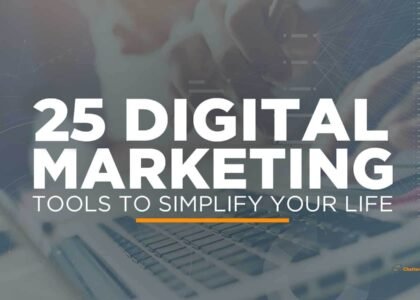Digital Media Marketing: Your Complete Handbook
In today’s dynamic business landscape, digital media marketing has become the cornerstone for brands aiming to forge strong connections with their audience. This modern approach to marketing leverages digital channels to engage, inform, and inspire audiences across various platforms. In this comprehensive handbook, we’ll dive deep into the fundamentals, effective strategies.
Understanding Digital Media Marketing:
Digital media marketing encompasses a diverse range of online strategies aimed at promoting products or services through digital channels such as websites, social media platforms, email, and search engines. Unlike traditional marketing methods, enables real-time interaction and personalized communication with audiences, driving engagement and fostering brand loyalty.
Core Elements of Digital Media Marketing:
1. Website Optimization
At the core of digital media marketing lies website optimization. A well-optimized website serves as the foundation of digital marketing efforts, attracting visitors, converting them into customers, and enhancing brand credibility. Elements such as responsive design, user experience, compelling content, and search engine optimization (SEO) play a vital role in maximizing website performance.
2. Social Media Engagement
Social media platforms provide unparalleled opportunities for brands to connect and engage with their audience on a personal level. By crafting compelling content, fostering conversations, and building communities, businesses can strengthen brand awareness, loyalty, and advocacy.
3. Content Creation and Distribution
Content creation is the heartbeat of digital media marketing. Whether it’s blog posts, videos, infographics, or podcasts, creating high-quality and relevant content helps brands establish thought leadership, drive traffic, and generate leads.
4. Email Marketing Campaigns
Email marketing remains a powerful tool for nurturing leads, retaining customers, and driving conversions. By delivering targeted messages tailored to individual preferences and behaviors, businesses can build relationships, promote products, and drive sales effectively.
5. Search Engine Optimization (SEO)
Optimizing content and websites for search engines is essential for improving visibility and driving organic traffic. By conducting keyword research, optimizing on-page elements, and earning quality backlinks, businesses can enhance their search engine rankings and attract relevant traffic to their website.
Advantages of Digital Media Marketing:
1. Expanded Reach and Visibility
Digital media marketing allows brands to extend their reach beyond geographical boundaries and connect with audiences worldwide. By leveraging digital channels, brands can amplify their visibility, attract new customers, and establish themselves as industry leaders.
2. Enhanced Targeting and Personalization
Digital media platforms offer advanced targeting options, enabling brands to deliver personalized messages to specific demographics, interests, and behaviors. By tailoring content and advertisements to individual preferences, brands can increase relevance and engagement, driving better results.
3. Measurable Results and Analytics
Digital media marketing offers robust analytics and tracking capabilities, allowing brands to monitor campaign performance in real-time and gain actionable insights. By analyzing data trends, identifying areas for improvement, and making data-driven decisions, brands can optimize their marketing efforts and drive better results.
4. Cost-Effectiveness and ROI
Digital media marketing often proves more cost-effective than traditional advertising channels. With options for pay-per-click (PPC) advertising, brands can allocate budgets efficiently and track ROI more accurately, ensuring maximum return on investment for their marketing efforts.
Effective Strategies in Digital Media Marketing:
1. Audience Research and Segmentation
Understanding the needs, preferences, and behaviors of your target audience is critical for crafting effective digital media marketing strategies. By conducting thorough research and segmenting audiences based on demographics, psychographics, and purchase behavior, brands can deliver tailored messages that resonate with their audience’s interests and motivations.
2. Content Strategy and Creation
A well-defined content strategy is essential for guiding digital media marketing efforts. By identifying content themes, formats, and distribution channels that align with business objectives and audience preferences, brands can create compelling content that attracts, engages, and converts customers effectively.
3. Social Media Management and Engagement
Active engagement on social media platforms is key to building brand awareness, fostering customer relationships, and driving website traffic. By posting regularly, responding to comments and messages promptly, and running targeted ad campaigns, brands can leverage social media to amplify their message and achieve marketing goals.
4. Email Marketing Automation
Email marketing automation streamlines communication with customers and prospects, delivering personalized messages at scale. By setting up automated email workflows based on triggers such as website visits, purchases, or email interactions, brands can nurture leads, reengage inactive subscribers, and drive conversions more effectively.
5. Continuous Optimization and Testing
Digital media marketing is an iterative process that requires continuous optimization and testing. By analyzing campaign performance, experimenting with different strategies and tactics, and adapting based on insights gained, brands can refine their approach, maximize results, and stay ahead of the competition.

Measuring Success in Digital Media Marketing:
Key Performance Indicators (KPIs)
Identifying and tracking key performance indicators (KPIs) is essential for evaluating the effectiveness of digital media marketing campaigns. Metrics such as website traffic, conversion rates, click-through rates, and return on ad spend (ROAS) provide valuable insights into campaign performance and help brands gauge their success relative to their objectives.
Analytics and Reporting Tools
Utilizing analytics and reporting tools such as Google Analytics, Facebook Insights, and email marketing platforms allows brands to monitor campaign performance in real-time and gain actionable insights. By analyzing data trends, identifying areas for improvement, and making data-driven decisions, brands can optimize their marketing efforts and drive better results.
A/B Testing and Experimentation
A/B testing empowers brands to compare different variations of their marketing assets and tactics to determine the most effective ones. By experimenting with elements like ad copy, imagery, landing page design, and call-to-action buttons, brands can pinpoint winning strategies and optimize their campaigns for maximum impact.
Challenges and Future Trends in Digital Media Marketing:
- Evolving Technology and Platforms The digital marketing landscape is in a perpetual state of evolution, with new technologies, platforms, and trends emerging regularly. Staying ahead of these changes and adjusting strategies accordingly poses a challenge for brands, necessitating ongoing education, experimentation, and innovation.
- Data Privacy and Compliance Concerns regarding data privacy and compliance regulations continue to influence the digital marketing landscape. Brands must navigate intricate legal frameworks like the General Data Protection Regulation (GDPR) and the California Consumer Privacy Act (CCPA) to ensure responsible and ethical collection, storage, and utilization of customer data.
- Rising Competition and Ad Costs With more brands investing in digital media marketing, the competition for audience attention and ad space intensifies. Escalating ad costs and saturation in key markets present hurdles for brands striving to achieve significant reach and engagement. This calls for a strategic approach to budget allocation and targeting.
Conclusion:
In conclusion, presents brands with unparalleled opportunities to connect with their audience, foster engagement, and attain marketing goals in the digital era. By harnessing the potential of digital channels, implementing effective strategies, and staying abreast of emerging trends, brands can navigate the digital landscape confidently and foster sustainable growth.







